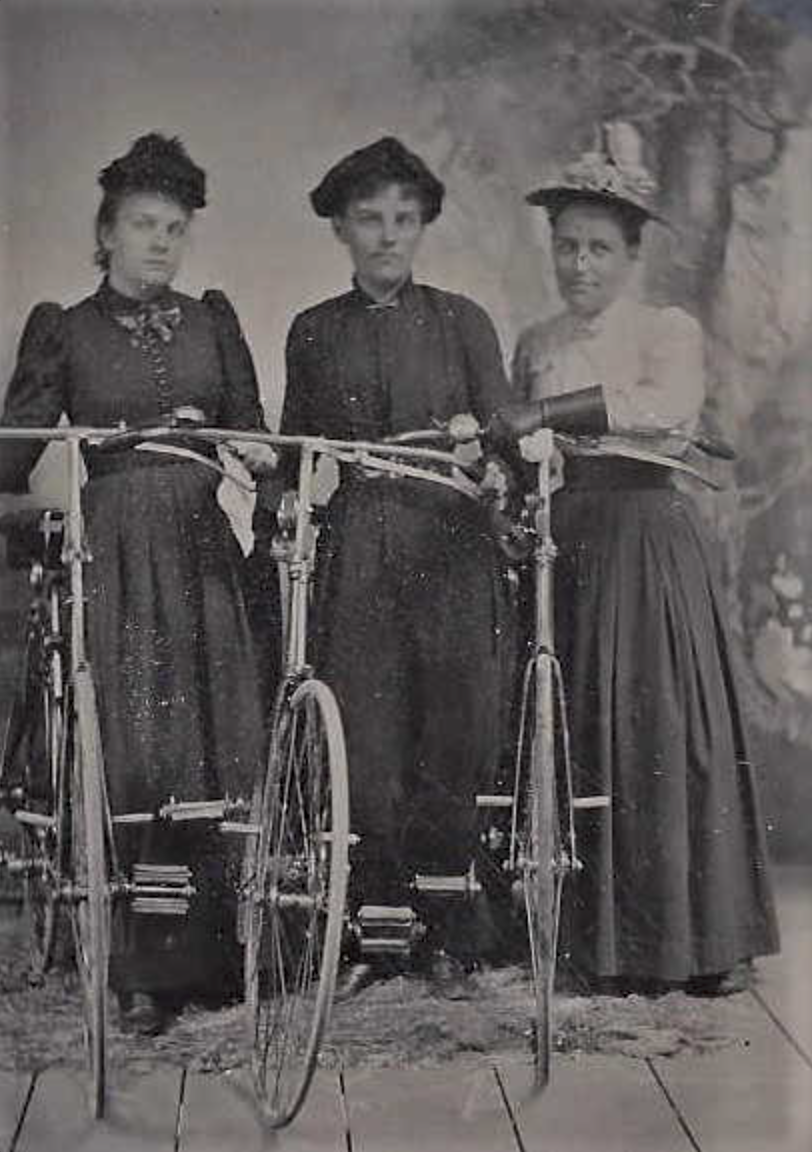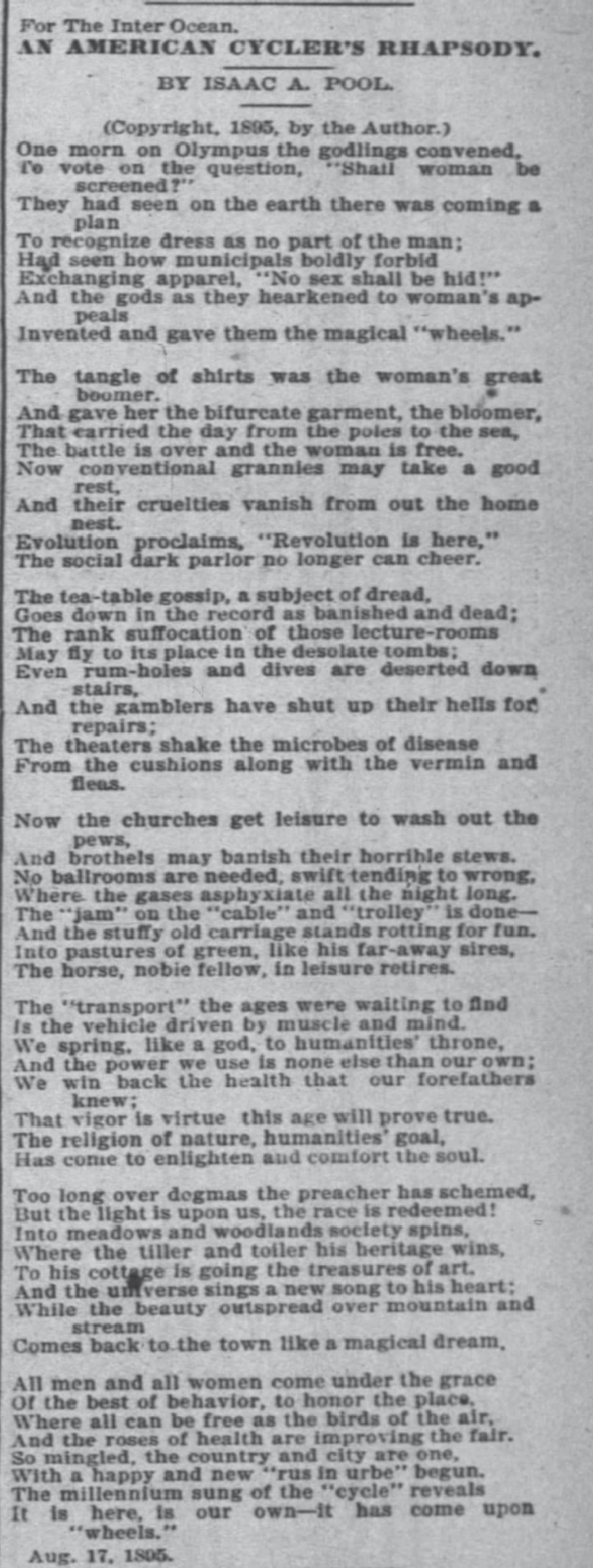An American Cycler’s Rhapsody
It’s always a treat receiving emails and messages from folks who have stumbled upon some cycling history in their family who hope to fill a hole in their research or share stories passed down across the generations.
This one came through our mailbox this week and given our current state of Covid quarantine, became a strong reminder of connection and how the bicycle can ignite curiosity, affect change, and bridge the gap between time (over a century in this case) and space (some thousand + miles).
Ruth, whom I received the message from, ended up with a box of family history that nobody else was much interested in and discovered, as she puts it, “an incredibly interesting cast of characters.” As it happens, this cast of characters were tied strongly to the bicycle trade during the 1890s.
One such character was Harry Aloysious Morris. Harry was the owner of the Escanaba Cycle House — a bicycle shop on the Upper Peninsula of Michigan. On August 27, 1896, Harry became the first person on the peninsula to complete a “century run”, riding 125 miles in about 10 hours time, and as luck would have it, atop a 19lb Keating bicycle.
As Ruth dove in deeper, she became more and more enamored by the bicycles revolutionary impact as well. Included in her message was an old portrait of two great-something aunts, posed with their bicycles, and the clipping of an original poem written in 1895 by a Great-Great-Grandfather, Isaac A. Pool, telling of freedom atop the bicycle and in particular, women’s emancipation from victorian era customs.
Reading through the soft and faded type, imagining Mr. Pool penning these words onto paper, I couldn’t help but get a little emotional. The bicycle has stood for well over 100 years now a symbol and vehicle for freedom and equality. Its ability to connect us and fortify powerful change is perhaps unequaled. I am constantly inspired by these stories from our past and amazed by just how much they parallel society today. The poem strikes strongly with its similarities, reminding me of the amazing and continued efforts for equality that organizations like WTF Bike Explorers and many others bring attention to today. It is crazy that in this day and age we still must fight for inclusivity, but I am happy knowing it is the bicycle on which we fight upon.
Through her research, Ruth has begun penning her own book. Circles turning circles it seems, and the everlasting power of the wheel.
Below, I have re-typed the poem for easier reading though have included a scan of the original for those interested.
An American Cycler’s Rhapsody
By Isaac A. Pool
Aug. 17, 1895
One morn on Olympus the godlings convened,
To vote on the question, “Shall woman be screened?”
They had seen on the earth there was coming a plan
To recognize dress as no part of the man;
Had seen how municipals boldly forbid
Exchanging apparel, “No sex shall be hid!”
And the gods as they hearkened to woman’s appeals
Invented and gave them the magical “wheels.”
The tangle of shirts was the woman’s great boomer.
And gave her the bifurcate garment, the bloomer,
That carried the day from the poles to the sea,
The battle is over and the woman is free.
Now conventional grannies may take a good rest,
And their cruelties vanish from out the home nest.
Evolution proclaims, “Revolution is here,”
The social dark parlor no longer can cheer.
The tea-table gossip, a subject of dread,
Goes down in the record as banished and dead;
The rank suffocation of those lecture-rooms
May fly to its place in the desolate tombs;
Even rum-holes and dives are deserted down stairs,
And the gamblers have shut up their hells for repairs;
The theaters shake the microbes of disease
From the cushions along with the vermin and fleas.
Now the churches get leisure to wash out the pews,
And brothels may banish their horrible stews.
No ballrooms are needed, swift tending to wrong,
Where the gases asphyxiate all the night long.
The “jam” on the “cable” and “trolley” is done—
And the stuffy old carriage stands rotting for fun.
Into pastures of green, like his far-away sires,
The horse, noble fellow, in leisure retires.
The “transport” the ages were waiting to find
Is the vehicle driven by muscle and mind.
We spring, like a god, to humanities’ throne,
And the power we use is none else than our own;
We win back the health that our forefathers knew;
That vigor is virtue this age will prove true.
The religion of nature, humanities’ goal,
Has come to enlighten and comfort the soul.
Too long over dogmas the preacher has schemed,
But the light is upon us, the race is redeemed!
Into meadows and woodlands society spins,
Where the tiller and toiler his heritage wins,
To his cottage is going the treasures of art,
And the universe signs a new song to his heart;
While the beauty outspread over mountain and stream
Comes back to the town like a magical dream.
All men and all women come under the grace
Of the best of behavior, to honor the place,
Where all can be free as the birds of the air,
And the roses of health are improving the fair.
So mingled, the country and city are one,
With a happy and new “rus in urbe” begun.
The millennium sung of the “cycle” reveals
It is here, is our own—it has come upon “wheels.”


